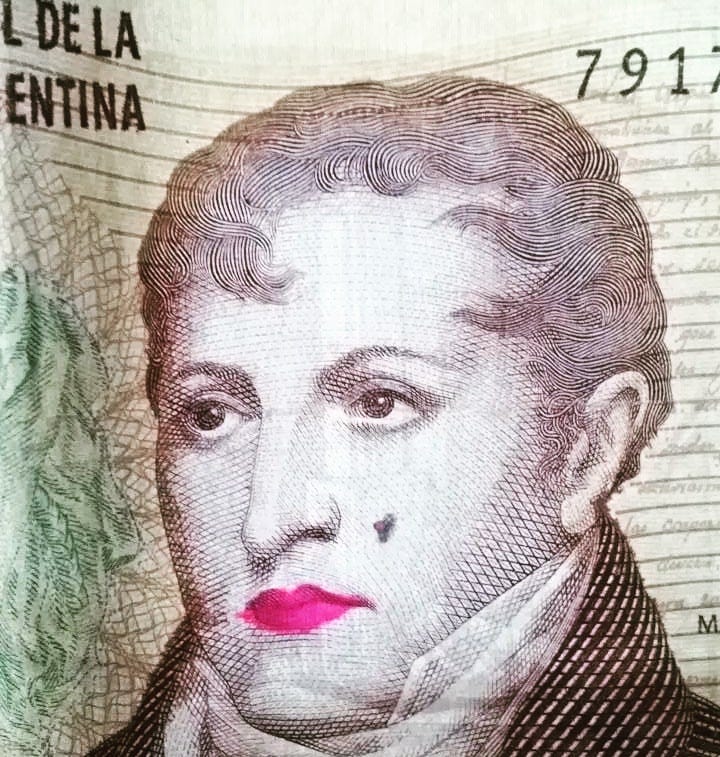The new millennia was received with little fanfare in Argentina, the country was broke and the days of alternative rock were a distant memory. The rave frenzy of 97-98 took all of its “hip” audience, and cumbia villera emerged as a reflection of the other side of the country, the one that was starving. Alt-rock dethroned, the folklore revival of Soledad and the cuarteto invasion lead by Rodrigo became responsible for most record sales by local artists during the end of '90s
After the socioeconomic collapse of 20010--which ended with the president escaping in a helicopter--there was a musical void, no one knew what was going to come next. Taking advantage of that situation the former leader of Avant Press and Soda Stereo/Gustavo Cerati protegee/collaborator Leo Garcia decided to release a single on mini-cd that was offered for free with each purchase in the two major record stores (Tower Records and Musimundo). The single, “Morrisey", was accompanied with a music video that would take the country by storm, and its lyrics were not about the former Smiths frontman but a love affair. From the first line that asked “does your girfliend know we listen to Morrisey?” the intent was clear, the campiness of the music video, his open talking about his sexuality in interviews, and it all came together to start many conversations and made him a household name. “Mar”, the album that contained it, was everywhere upon its release in 2001, and received positive criticism thanks to a unique blend of acoustic guitars and electronic beats into something unapologetically POP.
The ground was now set and soon Adicta and Miranda!--two bands that were stirring up things in the underground for a couple of years--got signed. Even though they were very different in style and background the same audience that embraced Leo embraced them. That audience consisted mostly of graphic design students (in the early ‘00s it became the most popular career, specially in the LGBT community). Adicta started as a duo (later a full five piece) consisting of singer Fabian “Toto” Nievas, with former Los Brujos Fabian Rey, and leaned into a more “goth-pop” style in the vein of late era Los Prisioneros, La Ley, and Virus, but with more of an edge. Miranda! was started by composer Ale Sergi and producer/DJ Bruno DeVicenti, (down the road they added guitar player Leandro “Lolo” Fuentes and female vocalist Juliana Gattas), who was a resident in one of the more iconic gay clubs of the ‘90s, Bunker. Their sound took influences from the cheesiest aspects of Spanish pop, and combined that with high end electronics to create what they described as “Pet Shop Boys doing the soundtrack to a telenovela”. With the aid of a local adult animation cable network called Locomotion they spread to a wide audience that would keep expanding until achieving worldwide success, specially in Mexico.
The impact these three artist made did not end there, although no one would come close to reaching their success they opened the door and inspired a wide array of personalities that are now accepted and celebrated, ranging from veterans in the drag scene (Peter Pank), popular club Djs (Fok Electrochongo, Djs Pareja), poets (Gabi Bex), former emo kids (NerdKids) producers (Viernes) and from Uruguay, Dani Umpi. The last, Dani Umpi, who dialed up the queerness and pop celebration to 11, his debut “Perfecto” from 2005 received the highest critical acclaim, but was too much for mainstream audiences. He inadvertently became the last icon to emerge from that small scene.
In December 2004 the Cromagnon tragedy happened (a rock venue caught fire, and blocked exits took the lives of 194 attendees), rock was pretty much banned from the few venues that were not shut down in the aftermath, specially in the Autonomous City of Buenos Aires. Only discos survived, and what few artists that kept going made a living singing to backing during the decade. The nearby city of La Plata gave birth to a new wave of indie rock and the media shifted focus.
By the end of the decade most of these artist had fallen from the limelight and retreated to gay clubs or were relegated to opening slots in festivals. But they were never forgotten, nor was their role in breaking the ground on LGBTQ awareness and rights: in 2010, same sex marriage was approved by the congress, making Argentina the first latin American country to recognize LGBT rights, and Leo Garcia performed in its celebration.




